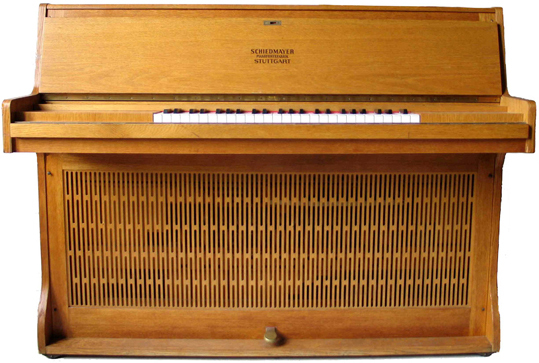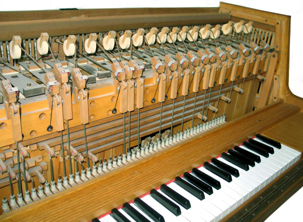mp3 Demo - Hommage to Schönberg (by Steffen Fahl)
mp3 Demo - Celesta aus Bergs 'Altenbergliedern'
mp3 Demo - Debussy 'Voiles' (Bd.1, Nr.2)
mp3 Demo - Tschaikowsky - Der Nussknacker: Tanz der Zuckerfee
Performed by Steffen Fahl
The performances contain additional reverb.
Invented over 125 years ago, the celesta remains a nicely obscure yet fascinating instrument: It sports a vibrant, mellow and charming sound remeniscent of a vibraphone, glockenspiel, marimba and a piano - yet a sound of its own.
At that time, it was inspiring to those looking for a new sound - Pjotr Tschaikowsky wrote some parts of his Nutcracker for a celesta. Its predecessor, the Dulcitone was rather quiet and unappropriate for orchestral use, whereas the Celesta offers rich harmonics and bell-like tone that chime with force.

Schiedmayer celesta from the Beurmann collection - photo by Andreas E. Beurmann
Back then, no one had ever dreamt that a celesta would be as relevant today as ever - being the acoustic ancestor of the most popular vintage electric pianos, which share the same basic sound principles. Providing a warm and full bass, it carries more weight than a toy piano and is great for any track demanding an unconsumed yet familiar sound.
This instrument out of the Beurmann collection was built by Schiedmayer in Stuttgart, Germany around 1960. It cost a fortune (and still does) - as a result, only few concert halls keep those around. The celesta is rather tough to play, offering a very tight and limited dynamic response. This is due to the hammers not touching moving strings but steel plates. However, the dynamics are more pronounced than with a Dulcitone, for example, since the hammers' lever stroke is considerably higher with the celesta. The steel plates are oppositely placed - this creates an unexpected stereo effect.

Under the hood of the celesta - photo by Andreas E. Beurmann
Capturing the dynamic shades, we recorded every note with 16 samples. We also recorded the key release sounds, providing 8 varitions per key to complete the virtual celesta. In addition, the library contains an essay in English by Dr. Andreas Beurmann, explaining the background of the instrument.
Presets are included for HAlion®, Kontakt® (full version required) and EXS24® software samplers.
The sample library contains nearly 1.200 single recordings.
For the recording process, we employed custom-made Wagner™ U47w® tube microphones in conjunction with Crane Song™ Flamingo® preamps and Universal Audio™ 2192® digital converters. The samples were recorded at 192 kHz/24 bits, downsampled to your resolution of choice.
Brand names, trademarks and product names belong to their respective owners.











